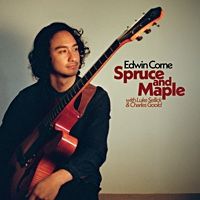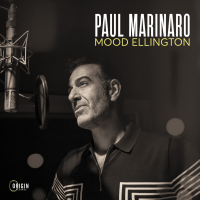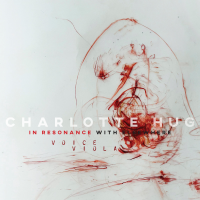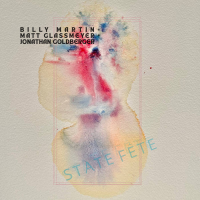Home » Jazz Articles » Album Review » Chris Squire: Fish Out of Water (Deluxe Edition)
Chris Squire: Fish Out of Water (Deluxe Edition)
Yes wasn't the first or only group to take a break in the midst of progressive rock's '70s heyday, during which time one or more band members would release one or more solo albums. The Moody Blues did it. Van der Graaf Generator did it. Emerson, Lake & Palmer did it too, though rather than releasing solo albums the solo efforts were ultimately collected on the two-LP ELP set Works (Volume 1) (Atlantic, 1977), where each member of the trio was allotted one side, with the fourth side containing the band's first new material together since its epic Brain Salad Surgery (Manticore, 1973).
Some of these solo albums would do well. In the case of Rick Wakeman's first solo album for A&M Records, 1973's The Six Wives of a Henry VIII—recorded and released prior to the first of his numerous departures from (and, ultimately, returns to) Yes in the spring of 1974—doing very well indeed, selling over two million copies worldwide in its first year of release and with contemporary numbers in the vicinity of fifteen million. Still, most labels were skittish when faced with groups, in whom they'd invested significantly and which had achieved the truly massive critical and commercial acclaim Yes had, deciding to take a break from each other to pursue solo careers. The result was that many labels did not invest the same kind of money in marketing these solo albums as they did full-on band efforts, and Fish Out of Water is no exception, though it still managed to sell a healthy half million copies in its first year. Imagine how well it would have done, had Atlantic Records been as fully behind it as it had Yes' releases.
That said, Yes' hiatus was probably still a good thing. Despite still selling healthy numbers and attracting large audiences, the band's star had begun to fall somewhat, especially critically speaking, with 1973's Tales from Topographic Oceans and, curiously, '74's exceptional Relayer (both reissued, in recent years, with new stereo and surround mixes and a bevy of extras, by Panegyric Recordings). Wakeman's replacement following Topographic, Swiss keyboardist Patrick Moraz, brought some very fresh ideas to Relayer. Many, in fact, still consider Relayer to be the band's second-best studio album next to 1972's Close to the Edge, and there are those who still wonder what might have been, had Moraz not been summarily dismissed when Wakeman agreed to return for 1977's Going for the One.
That the group was off the road for just six months during the summer and fall of 1974 to recruit Moraz, and to record, release and prepare to tour Relayer is emblematic of the kind of rapid evolution many progressive rock groups were experiencing at the time. Still, unlike other bands, whose members took real time away from each other during their solo pursuits, Yes actually continued to tour in 1975 and '76, though only for approximately four months each year, a significant reduction from the almost relentless gig schedule the band had maintained from 1971 through 1974, and leaving its members ample time to work on their solo efforts.
Still, that Fish Out of Water was conceived, recorded and released in such a short period of time, during the spring and summer of 1975, with an initial release date of November 7, 1975, reflects the kind of wellspring of creativity that was both taking place regularly at the time and being given significant major label attention.
But why is Fish Out of Water (its title referring to Squire's nickname, "the Fish") such a remarkable album from a time when it seemed that so many extraordinary recordings were being released; why does it stand out so?
Well, perhaps some of the most compelling reasons are, for an album that clearly emphasizes the "progressive" in "progressive rock," the many things it is not. Unlike so many progressive rock albums of the time, Fish Out of Water features no mellotrons; instead, Squire chose to employ a real orchestra throughout the album, with orchestrations written and conducted by Andrew Pryce Jackman, with whom Squire first played in the pre-Yes band The Syn, and with whom the bassist considered his first solo album to be an overdue reunion.
Barring some Minimoog bass on the episode "Silently Falling," there are also no synthesizers to be found; in fact, barring some electric piano on the groove-laden "Lucky Seven," the only keyboards played by Moraz and Jackman are organ and acoustic piano respectively, along with some particularly beautiful pipe organ work from Barry Rose (then, sub-organist of London's St. Paul's Cathedral) on the opening "Hold Out Your Hand."
There's also virtually no guitar—electric or acoustic—to be found, other than some jagged Rickenbacker 12-string electric guitar chords towards the end of "Silently Falling."
As for the qualities that define and unify Fish Out of Water? Without a doubt, Squire's immediately recognizable, at times viscerally forceful but elsewhere profoundly lyrical playing, where he manages to marry the role of rhythmic/harmonic anchor with both melodic counterpoint and, at times, staggeringly virtuosic soloing. Squire is also generally more dominant in the mix than with Yes, whether he's soloing with fiery intent on "Lucky Seven," contributing visceral fills and brief solo passages (along with his riff-based underpinning) on the opening "Hold Out Your Hand," or simply commanding attention throughout the rest of the album as he finds innovative intersections between various instrumental roles.
Additionally, this point in his career, Squire had rarely been heard so clearly as a singer. Beyond revealing a vocalist who could have (and, perhaps, should have) been featured more often, Fish Out of Water's many choir-like passages, with Squire overdubbing a multiplicity of layers, shapes a collective sound considerably different to Yes' equally appealing harmonies.
It's not really a surprise that Fish Out of Water would, quite simply, not have been the same were it not for the greater freedom afforded to Squire's playing, singing and writing.
Nor would Fish Out of Water have been as special without Bill Bruford's distinctive approach to the sound/tone of his kit and his combination of mathematical precision and increasing freedom when playing it. While possessed of a different kind of virtuosity when compared, say, to ELP's Carl Palmer, Bruford's absolutely rock-solid time and more ensemble-driven approach allow Fish Out of Water to groove, travel from elegant delicacy to propulsive power, and breathe in ways that many progressive rock albums of the time simply did not.
It's also impossible to think of Fish Out of Water without Andrew Pryce Jackman's skillfully crafted and sonically evocative symphony orchestra contributions and, just as importantly, how his arrangements render Squire's writing even more vivid and sui generis. Never before had Squire's compositional voice been heard so distinguished from Yes—and, while he (understandably) considered Jackman's orchestral contributions to be deserving of co-compositional credit, the pianist/orchestrator declined, leaving all five compositions credited to Squire alone.
Squire is quoted, in the interview and on the opening page of Sid Smith's enlightening liner notes, as saying: "Those were really pioneering days. None of us knew exactly what we were doing." It's the sign of a mindset where trial and error and the premise that nothing was forbidden encouraged musicians to experiment in a freer fashion that has only really returned in the new millennium—albeit, hobbled by a drastically altered music industry landscape that means far fewer people actually get to hear the fruits of such efforts. Music has rules, of course, but between learning these rules in order to be capable of breaking them, and operating from an actual position of lack of knowledge, musicians were encouraged to try things because, indeed, anything and everything was truly possible.
Still, for someone who claimed not to know exactly what he was doing, Squire managed, with his very first solo album, to hit it right out of the park, as he'd done (and would continue to do) with Yes, a band that, from 1971-77, may have made a few missteps but was certainly defined by, well, perpetual change. On Fish Out of Water, however, Squire proves an even more prominent instrumental force than with Yes, where his work was as fundamental to that group's sound and direction during the '70s as Jon Anderson's soaring alto tenor voice, Steve Howe's unorthodox guitar work, Bruford or White's varying approaches to percussion, and original keyboardist Tony Kaye's specifically ensemble-driven keyboards, Wakeman's more overtly virtuosic classicisms or Moraz's equally masterful but more decidedly jazz-centric tendencies.
There are a number of other reasons to recommend Fish Out of Water, many of them as much about the unique textures brought to the album as the ever-expert performances from all involved.
First, beyond his individual contributions to Fish Out of Water, having left Yes on the very cusp of major commercial success for the more improvisation-oriented King Crimson, it's a real treat to hear drummer Bill Bruford back together with Squire, albeit having learned more than a thing or three from his time with Robert Fripp's then-recently dissolved group, including some unexpected percussive sonics, like his particularly splashy cymbal on "Lucky Seven."
Squire and Bruford remain one of the most instantly recognizable, provocative rhythm sections in the history progressive rock, from Yes' earliest days on its 1969 self-titled Atlantic debut, right through to that landmark final collaboration on Close to the Edge. If Alan White has served as a solid if, perhaps, less distinctive replacement for Bruford in Yes in the ensuing years, at the time of Fish Out of Water it felt as though there was still some unfinished business between Squire and his fellow Yes co-founder. It's hard, in fact, to imagine Fish Out of Water with anyone behind the drum kit but Bruford, whether it's the snapping snare grounding the metrically challenging "Hold Out Your Hand" or his positively frenetic work during Moraz's supercharged organ solo, over alternating bars of six and five, during the high-velocity, double-time middle section of "Silently Falling."
It is also great to see Squire recruit Moraz rather than the perhaps more obvious choice of Wakeman. The Swiss keyboardist may only be afforded one major feature (a fiery solo on "Silently Falling"), but it's an absolute stunner—certainly one of the most impressive solos of his career. And, whether or not it's the first use of Minimoog bass that Squire suggests in the 2006 interview with Jon Kirkman that's included in the box set (definitely an assertion that, retrospectively, is easy to disprove), Moraz's synth bass lines certainly allow Squire to improvise more freely on "Silently Falling."
Barry Rose's pipe organ work is also a defining sonic on "Hold Out Your Hand," especially with its dramatic opening changes. It's unfortunate that another Squire composition, "Parallels," was written for Fish Out of Water but was ultimately rejected, because the other five tracks were already stretching the general 40-minute limit rule for LPs at the time. It ended up on Yes' next album, 1977's Going for the One, and was certainly an album high point, with returning keyboardist Wakeman playing a church organ in Vevey, Switzerland, where the album was recorded. But who knows how the core lineup of Squire, Jackman, Bruford and Rose might have interpreted it?
Two other players are used equally sparingly but to great effect on Fish Out of Water. Current King Crimson returnee Mel Collins' tenor saxophone underscores parts of "Silently Falling," but it's on "Lucky Seven" that he's more eminently featured, for both the improvised alto saxophone line that ultimately helps define the tune and for his soaring soprano saxophone solo towards the song's end. Fellow reed/woodwind multi-instrumentalist Jimmy Hastings, best known for his work with Canterbury groups including Hatfield and the North, Caravan, Soft Machine and National Health, contributes some slowly developing, absolutely beautiful flute work to "You By My Side," and is featured, again, during the intro and first verse of "Silently Falling."
It's also impossible to overstate Jackman's contribution to the album. It may be more ensemble-oriented and very much about his orchestral contributions, which make full use of a symphony orchestra's strings, horns, brass and woodwinds; but his work throughout Fish Out of Water, both on pianos and in his orchestrations, is truly career-defining and a large part of what makes the album so unique. Far from the first time a symphony orchestra had been combined with a rock group, few sound, however, as natural a fit as Jackman's work on Fish Out of Water.
That Jackman, like Squire, did not live to see this Deluxe Edition of Fish Out of Water is a real shame, with the pianist passing away in 2003 at the too-young age of 57, and Squire passing away in 2015, at an equally youthful 67. But if either of them happen to be looking down from someplace, somewhere, they'll certainly be proud of their accomplishments with Fish Out of Water—and of what Esoteric has done, with relatively little additional new material, to make this Deluxe Edition something special.
There's a remastered version of the original mix provided on 180-gram vinyl (housed in a gatefold replica of the original sleeve), on CD, and on DVD in 24-bit/96KHz high resolution. Current Crimson guitarist/vocalist Jakko M. Jakszyk has also contributed new stereo and 5.1 surround sound mixes, with the stereo mix available on a second CD along with high resolution versions of both mixes on the same DVD as the high res remaster of the original stereo mix. The remastered original mix CD also includes single versions of "Lucky Seven" and "Silently Falling," along with both sides of a Christmas single that Squire produced with Alan White in 1981, "Run With the Fox" and "Return of the Fox." The two singles are also included as separate 7" 45RPM singles.
A second DVD contains the same content as the 2006 double-disc reissue: a 42-minute, 2006 interview with Squire by writer, archivist, researcher and occasional record executive producer Jon Kirkman; an 11-minute promotional film with live (without an audience) performances of "Hold Out Your Hand" and "You By My Side," complete with every participating band member and full orchestra; and a 50-minute audio commentary to Fish Out of Water, where Squire discusses the album as it's playing.
Between the interview and commentary, there's a wealth of information, great and small, about both Fish Out of Water and Squire's work with Yes. There are small but juicy tidbits, like the bass sound he achieved on one of Yes' biggest hits, "Roundabout" (from 1971's Fragile), by doubling his signature bass lines on electric guitar and then bringing them together in the mix. Squire also discusses some of the bassists who have informed his early work, including, unsurprisingly, The Beatles' Paul McCartney, The Who's John Entwistle and Cream's Jack Bruce, along with, more unexpectedly, the The Rolling Stones' Bill Wyman. And he explains why the bass sound on the funky "Lucky Seven" is different from much of the rest of the album, played on a warmer-toned Fender Telecaster bass rather than his usual Rickenbacker.
Self-effacing, eager to give credit where credit's due, Squire's interview and commentary reflect surprising humility from a member of a group whose egos began to break it apart from the inside, resulting in multiple departures and returns to the point that there are now actually two different versions of Yes preparing to celebrate its 50th anniversary in 2019: one, with which original co-founder Squire was associated until his passing and which now features only Steve Howe and (when his health allows him to play) Alan White as sole remaining members from the band's classic '70s lineup; the other, a collaboration between co-founder Jon Anderson, Wakeman and '80s/'90s Yes guitarist Trevor Rabin.
The two most dominant ideas that come through both the interview and commentary are that this album really was a reunion for Squire and Jackman, a pianist whose orchestral abilities dated as far back as The Syn and which clearly influenced and informed Squire's compositional and arrangement contributions to Yes; and that many of Fish Out of Water's best moments were, in fact, "happy accidents."
Just examining one track, the album-closing "Safe (Canon Song)," reveals a number of these happy accidents. Its quiet coda is one: something not really planned, with Squire layering some gentle, delay-driven bass lines following the orchestral crescendo that would normally have been the song's conclusion. But a second is how the sound of those very same bass parts were achieved, with Squire playing them on the bass neck of his double-neck bass/guitar, but with the guitar pickups on.
Most notable, however, is that the song was originally envisioned as a much shorter, song-length piece; but then, with Squire's love of this particular classical form, Jackson and the bassist shaped an extended, fugue-like ending that expands "Safe (Canon Song)" from, at most, a five-minute song to a fifteen-minute epic. Repeated figures are brought to vivid life through Jackman's imaginative use of the symphony orchestra, with a solo passage for Bruford, a tempo which elastically stretches and contracts, and various motifs, sometimes passed around the orchestra, other times slowly coalescing and, ultimately, gradually building to a near-closing climactic peak. It's no hyperbole to suggest that Fish Out of Water's closing ten minutes represent one of the most seamless and organic integrations of symphony orchestra with rock instrumentation—at the time, without a doubt, but perhaps even to this day.
A 36-page softcover book contains characteristically enlightening liner notes from Sid Smith—no small challenge since the norm is to interview the artist extensively. Instead, Smith relies upon Kirkman's video interview, as well as additional interview contributions ranging from fellow Syn Steve Nardelli and Jackman's brother, Fish Out of Water engineer Gregg Jackman, to Bruford, Moraz, Collins and multi-instrumentalist Billy Sherwood—who, after co-producing, engineering and mixing the studio tracks recorded for Yes' mid-'90s classic lineup reunion on the two-volume Keys to Ascension, followed by singing and playing guitar and/or keyboards with Yes on 1997's Open Your Eyes and 1999's The Ladder, has since stepped into Squire's extraordinarily large shoes in the current Howe/White Yes incarnation.
The booklet also contains, in addition to a brief interview with Jakszyk (who discusses his approach to remixing the album), photos of Squire from the time and from the 2006 sessions to his 2007 Christmas album, Chris Squire's Swiss Choir—the bassist's only other solo album, which featured a Baroque choir in addition to contributions from ex-Genesis guitarist Steve Hackett, keyboardist Gerard Johnson, current Crimson drummer Jeremy Stacey, vocalist/musical director (and brother to Andrew Pryce) Jeremy Jackman, soprano Amy George, vocalist Laura Macara and Alan White. There's also a complete set of lyrics, along with three appendices containing everything from reproductions of tape boxes and track sheets from the original sessions to advertisements, a review from the time, and images of the international singles of both "Lucky Seven/Silently Falling" and "Run With the Fox/Return of the Fox."
Everything is housed, along with a full-size poster of the back cover image—a piece of Tiffany-made, 3D stained glass from a shower in Squire's home—in a larger, heavy cardboard slipcase. The original front cover is reproduced: a distinctive photo of Squire that was another happy accident, with the bassist caught standing behind some metal latticework that was on either side of an elevator in the Detroit Hilton, shot by Brian Lane on a just-purchased Polaroid Instant Camera. The back cover features the original album back of the Tiffany stained glass, along with an archival photo of Squire and full details of the box set's contents. It's a remarkable achievement for Esoteric to have made so much with so relatively little.
An achievement that follows through to Jakszyk's remixes. The original mix—also available, with Jakszyk's new stereo mix and the two singles, in a less pricey two-CD version of Esoteric's Fish Out of Water reissue—sounds as good as it's likely ever to sound, with Paschal Byrne's current remaster (from the original master tapes) making an already great-sounding album even better. But Jakszyk's work, both in his suitably (and impressively) immersive surround mix and revised stereo mix, are somewhat different to remixes the Crimson guitarist/vocalist has done for other groups including Crimson, Emerson, Lake & Palmer, Jethro Tull and Bruford's late-'70s band, Bruford.
When Jakszyk received the multi-tracks for Fish Out of Water, he discovered there was precious little additional material such as alternate takes or additional unused tracks. Jakszyk's approach to remixing classic music (in particular when referring to new stereo mixes) has always been less about "merely" providing greater clarity, a broader soundstage, greater warmth where required and more punch when needed (all of which he does), and, instead, suggesting an alternative perspective.
Still, with so little extra material with which to work, the stereo remix is, indeed, warmer, punchier, clearer, cleaner and more revealing, with Squire's bass, in particular, no less forward (and just as bright and gritty), but less harsh than it was, at times, in the original mix. Perhaps the biggest change Jakszyk was able to make was to "Lucky Seven," where he discovered that the orchestral parts that originally came in around the three-minute mark on the original mix were, in fact, already there almost from the start, and so he brings them in during the song's instrumental introduction in the first minute, creating a different kind of build to a song that is almost entirely based on a simply two-chord vamp but, through creative arrangement, orchestration, soloing from Squire and Collins, and Squire's rich vocal harmonies, easily sustains itself over the course of nearly seven minutes.
It's always easy to think about the "what might have beens," especially with an album as truly singular as Fish Out of Water. What more might the collaboration between Jackman and Squire have yielded, had Squire continued to make solo recordings? What might have been the result, had the trio of Squire, Bruford and Moraz (which the keyboardist suggests as a "what could have been" in Smith's liners) actually come to pass?
These are questions for which, of course, the answers will never be known. But with this Deluxe Edition of Fish Out of Water, Esoteric Recordings have delivered the final word on an album that must surely stand as one of the most ambitious and successful solo albums from back in the day. It's a record that those too young to have been around at the time (but who have contributed to progressive music's current resurgence) need to hear. Between the lovingly remastered original mix, Jakszyk's revealing new stereo and surround mixes, Smith's liners and Esoteric's attention to virtually every detail in every way, the rare achievements of Fish Out of Water are now available with the kind of 21st century upgrades that render it even more essential than when it was first released 42 years ago.
Track Listing
CD1 (New Stereo Mix by Jakko M. Jakszyk): Hold Out Your Hand; You By My Side; Silently Falling; Lucky Seven; Safe (Canon Song).
CD2 (Original 1975 Stereo Mix Re-Mastered): Hold Out Your Hand; You By My Side; Silently Falling; Lucky Seven; Safe (Canon Song); Lucky Seven (bonus, single mix); Silently Falling (single version); Run With The Fox (bonus with Alan White, A-side of 1981 single); Return of the Fox (bonus with Alan White, B-side of 1981 single).
DVD1 (New High Resolution 5.1 Surround [DTS 96/24 & Dolby AC3] and Stereo [24/96] Mixes by Jakko M. Jakszyk, Re-Mastered Original Mix [24/96]: Hold Out Your Hand; You By My Side; Silently Falling; Lucky Seven; Safe (Canon Song).
DVD2 (Visual Content): Fish Out of Water Promotional Film, featuring "Hold Out Your Hand" and "You By My Side" (10:46); 2006 Chris Squire Interview with Jon Kirkman (41:49); 2006 Fish Out of Water Audio Commentary by Chris Squire (53:39).
Vinyl Content: LP (Original Stereo Mix Re-Mastered, released November 1975): Side One: Hold Out Your Hand; You By My Side; Silently Falling. Side Two: Lucky Seven; Safe (Canon Song). 7" Single-1, Side One: Lucky Seven (Single Mix); 7" Single-1, Side Two: Silently Falling (Single Version). 7" Single-2 (Chris Squire & Allan White), Side One: Run With The Fox; 7" Single-2 (Chris Squire & Allan White), Side Two: Return of the Fox.
Personnel
Chris Squire
bassBill Bruford: drums and percussion (CD1, CD2#1-7, DVD1, DVD2#3, LP, 7" Single-1); Mel Collins: saxophones (CD1, CD2#1-7, DVD1, DVD2#3, LP, 7" Single-1); Jimmy Hastings: flute (CD1, CD2#1-7, DVD1, DVD2#3, LP, 7" Single-1); Patrick Moraz: organ and bass synthesizer (CD1, CD2#1-7, DVD1, DVD2#3, LP, 7" Single-1); Barry Rose: pipe organ (CD1, CD2#1-7, DVD1, DVD2#3, LP, 7" Single-1); Andrew Pryce Jackman: acoustic and electric pianos (CD1, CD2#1-7, DVD1, DVD2#3, LP, 7" Single-1); Chris Squire: basses, vocals, 12-string electric guitars (CD1, CD2#1-7, DVD1, DVD2#3, LP, 7" Single-1); Orchestra Leaders: Julian Gaillard, strings (CD1, CD2#1-7, DVD1, DVD2#3, LP, 7" Single-1); John Wilbraham, brass (CD1, CD2#1-7, DVD1, DVD2#3, LP, 7" Single-1); Jim Buck, horns (CD1, CD2#1-7, DVD1, DVD2#3, LP, 7" Single-1); Adrian Brett, woodwinds (CD1, CD2#1-7, DVD1, DVD2#3, LP, 7" Single-1), Alan White: drums (CD2#8-9, 7" Single-2); Dave Lawson: keyboards (CD2#9, 7" Single-2#2); Nikki Squire: vocal (CD1#1, CD2#2, CD2#9, DVD1#1, DVD1#6, DVD2#1, DVD2#3, 7" Single-2#2).
Album information
Title: Fish Out of Water (Deluxe Edition) | Year Released: 2018 | Record Label: Esoteric Recordings
Tags
PREVIOUS / NEXT
Support All About Jazz
 All About Jazz has been a pillar of jazz since 1995, championing it as an art form and, more importantly, supporting the musicians who make it. Our enduring commitment has made "AAJ" one of the most culturally important websites of its kind, read by hundreds of thousands of fans, musicians and industry figures every month.
All About Jazz has been a pillar of jazz since 1995, championing it as an art form and, more importantly, supporting the musicians who make it. Our enduring commitment has made "AAJ" one of the most culturally important websites of its kind, read by hundreds of thousands of fans, musicians and industry figures every month.
























